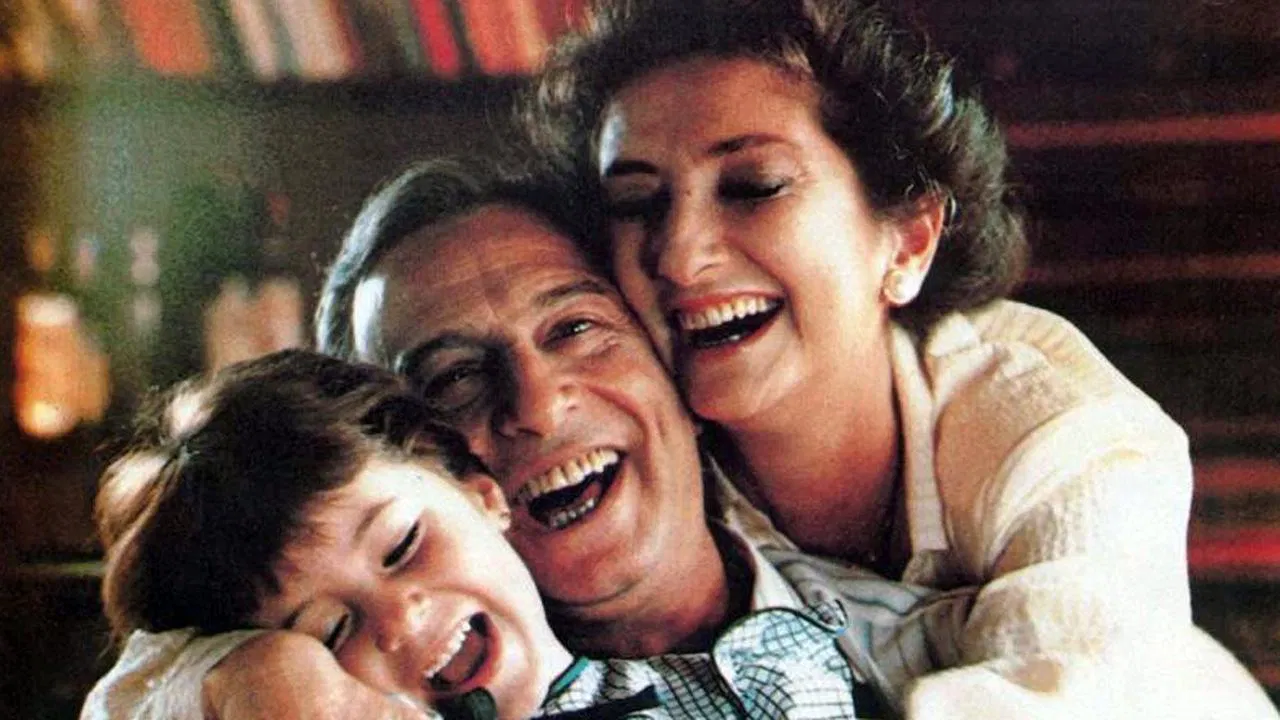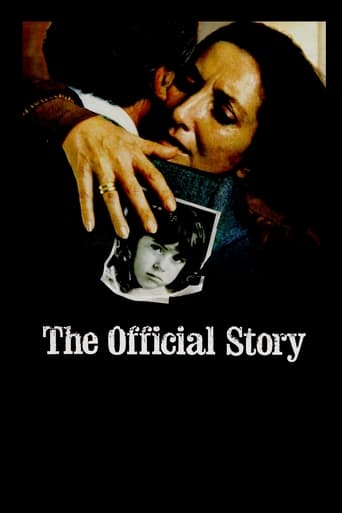

Well, I usually don't see much of the foreign language films but after viewing Oscars giving a special award to such great films, I almost got swept off at viewing few films. This one too was one of them where a viewer can't get delight in each scene after scene. But there might be impacts ringing to-and-fro after finishing the whole. The story is quite engaging related to societal issues waving around Argentinian people and their disappeared families. How would one react on losing someone close is what depicted unwaveringly. This was the movie which made me cry at certain scenes. Some dialogs even made me numb. The power of this film lies in placing ourselves into the place of characters of the film. It derives the feelings inside us for how would we react when we are placed into situation of losing a very important thing of our life. Undoubtedly, this movie is the one which shows human emotions on some very realistic aspects of life. This film has also played some beautiful strokes in the field of analyzing history of Argentina. And that is what makes the film to watch with top determination.
... View MoreThis film is intriguing and emotional. The Official Story tells of a woman who is searching for information about the unknown origins of her adopted daughter. The title itself suggests a lack of truth in regards to the history and events of Argentina. There is an "official story" that Alicia has contently lived with her whole life, but now begins to question the validity of it when she realizes that things aren't as they have always seemed. The irony of a history professor who isn't aware of her own past is interesting and a bit frustrating. The character development of Alicia throughout the movie is impressive. The audience is introduced to Alicia as a privileged upper-class woman who hasn't a care in the world, but who then slowly comes to realize the horrors of her current society and begins to question everything. I was impressed by Alicia's strength and determination to search out the truth despite all the obstacles that she faces.
... View MoreDirected by Luis Puenzo, The Official Story was truly an eye opening film in my view. Taking place shortly after the 1976 coup d'etat in Argentina, this film mainly follows the life of Alicia, Roberto, and their adopted child Gaby. Alicia, who is a history professor, enjoys a privileged lifestyle due to her successful husband Roberto, who is a prominent businessman in Buenos Aires. Unfortunately, living such a lifestyle has made Alicia somewhat ignorant in understanding the suffering of her very own people, especially in regards to the military take over of 1976.Thanks to a get together with her friend Anna, Alicia is told the horrors which took place; some of which include kidnappings, rapes, and torture. In some instances, the individuals rounded up, were forced to give up their kids for adoption. Knowing that Gaby is adopted, Alicia realizes that she could have been the daughter of an individual who indeed suffered due to the unforgiving military junta of the time. Alicia soon finds herself on a quest to find the real mother of Gaby, by checking birth records of various hospitals in Buenos Aires. While doing so, she inevitably is met by Gaby's grandmother, who presents Alicia with photos of Gaby's parents who are deceased. Alicia is shocked to find this out, but in reality, Gaby's parents were only one of thousands who were inhumanely slaughtered by the military junta.Having conferred with Gaby's grandmother, Alicia tries to introduce the lady to her husband Roberto. However, Roberto is infuriated and believes the old grandmother to be a lunatic that is a scum of society. Thankfully, Alicia shrugs this incident off, and at the end of the movie, Roberto, albeit indirectly, admits that Gaby indeed is the child of the two deceased parents in question.Overall, The Official Story was a well-made film. It not only had elements of comedy, drama, but also gripping suspense. All these elements were presented in a fashion that is atypical of traditional Hollywood, yet very effective nonetheless.
... View MoreI believe the filmmaker's purpose was to charge the viewer to ask the following questions: How far will I go in obtaining the truth of the world I live in for myself? Am I willing to make sacrifices and take risks in obtaining the truth? And, am I willing to suffer the opposition that will attempt to silence me in my journey? These questions are answered while the viewer lives vicariously through Alicia's own journey for the truth. Although the ending is ambiguous and the viewer never finds out whether Alicia obtains the truth of her daughter, it seemed to me implicit that she does. I believe that if the director had chosen (which thankfully he didn't) to extend the film a little longer, the viewer would have seen that Alicia consents in giving her daughter back to the elderly woman. I have four reasons for this, all which support the questions above.1). Alicia is the type of woman who wants nothing but the truth and that anything less would torment her mind with guilt. She expresses this guilt to her priest, telling him that she doesn't deserve her daughter if the adoption isn't legal. The lighting during this sequence is dark and dismala directing choice that reflects the inner-darkness Alicia is experiencing.2). It is implied through her conversation with the elderly woman that despite how much she loves her daughter, and, that to lose her would be a painful sacrifice, she would still stand for the truth and do what is right. And what is right the right choice? For Alicia, it is to give her daughter back to the rightful and secondary parent.3). Her tenacity to exhaust her abusive husband in telling her the truth, despite getting beaten by him, demonstrates her willingness to suffer all types affliction in order to arrive at the truth. There is a particular shot that demonstrates even the husband's belief that the right thing to do is to give the daughter back. At the end of the film, after the husband has beaten up Alicia and is listening to his daughter on the phone, the camera begins to slowly dolly towards his face. The shot persists for a good minute or so, capturing a single tear falling from his cheek. This suggested to me that despite the husbands love for his daughter, he was beginning to feel that it wasn't right for them to keep their daughter after all.4). After her husband storms out of the house refusing to listen to her and the elderly woman's case, the elderly woman asks Alicia, "Shall I expect a call from you tomorrow or shall I call?" The use of script development here through Alicia's willingness to initiate the phone call spoke volumes in suggesting that she truly believes her daughter is not lawfully hers. If she had said, "You call," it would have suggested that she was not only reluctant but also skeptical whether this woman's case was plausible.Even the title of the film, an element of production design, seemed to suggest the quest for what is true. Given the Spanish rendering, "La Historia Oficial," which in English is interpreted, "The Official History," there is an interesting contrast shown between the words of the English rendering, "The Official Story," and its original title in Spanish. The difference is in the words "history" and "story". The word history seems to suggest factsthe truth of what really happened. On the other hand, the word story seems to suggest fablesthe lies used to cover up the truth. Either way you look at it, Alicia's search for the official history (truth) or the official story (lie) regarding her daughter works as a powerful way in conveying what the central theme of the film iswhat is the truth and what are the lies.
... View More